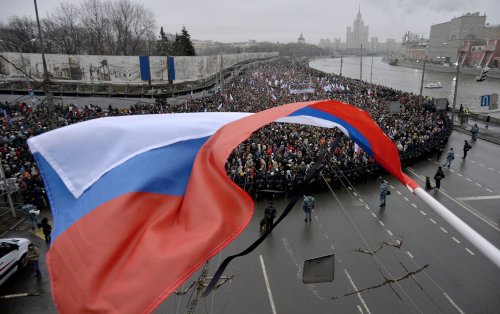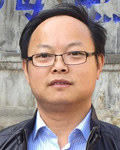|
 |
|
GREY AND GRIEVING: Russian opposition supporters march in the memory of murdered Kremlin critic Boris Nemtsov in central Moscow on March 1 (XINHUA/AFP) |

The slaying of Russian opposition politician Boris Nemtsov in February has not triggered anti-government sentiment or radical criticism, suggesting weakness in the country's opposition parties and the continued strength of Russian President Vladimir Putin's control over domestic politics.
The 55-year-old politician Nemtsov was a unique political figure in Russia. In 1999, Nemtsov and his right-wing political party won the election to the State Duma, Russia's parliament, in which he also became the vice speaker. In the last decade, Nemtsov was a key member of the Russian opposition and a serious critic of the Russian president.
While the reactions were moderate, many people remain skeptical of the government's investigation. Some suggested the murder was closely linked to Putin or his political allies near the center of power. Others believed that Nemtsov could have been killed by the pro-Western forces or even U.S. intelligence agents.
Shortly after Nemtsov's death, Putin aimed to show that he had no part in Nemtsov's murder by condemning the vicious political murder and ordering local police to implement a prompt and thorough investigation. Major Russian media outlets speculated about the murderers but did not make links to the Kremlin. Rather, they focused on Nemtsov's personal profile.
The assassination happened just a day before the scheduled opposition gathering in Moscow, organized by the opposition to call for a stop to armed conflict in eastern Ukraine. The gathering was not postponed by Nemtsov's death. Rather, on March 1, thousands of supporters marched in memory of him in central Moscow. The peaceful gathering showed that the Russian opposition is calm and clearheaded about Nemtsov's murder, and did not seek to capitalize on the situation as an opportunity to stage a revolt.
Russian politics stable
The Putin administration has remained stable in spite of the opposition leader's murder as well as the many external problems that have stemmed from its confrontation with the West since last year.
It has been 15 years since Putin entered into the core of power in Russia in 2000 when he was first elected as Russian president. At the beginning of his term, he pulled the country back from disaster by addressing a number of challenges left over by his predecessor Boris Yeltsin, such as political volatility and economic stagnation. In his two consecutive terms, the leader cemented his rule by implementing a series of strong measures. For example, notorious oligarch groups have been greatly weakened while political order has been restored. Russia embraced years of fast economic growth before 2008 thanks to rising oil prices. All of these achievements bolstered Putin's standing as an effective leader.
Putin ended his presidency but remained in power as prime minister under his political partner Dmitry Medvedev, who was elected president. Their political alliance kept Putin near the height of power under the political banner of the United Russia party, thereby ensuring Putin's return to the presidency in 2012. Nevertheless, an economic downturn following the 2008 global financial crisis and armed conflict with Georgia weakened Putin's political prestige. In the 2012 presidential election, Putin won with 63 percent support--far less than the overwhelming 71 percent in the previous election.
The decline suggested that despite his election victory, Putin had failed to win over the whole of Russian society. In recent years, the country has undergone profound changes as evidenced by the emergence of numerous domestic interest groups and declining support for the tough leader's "sovereign democracy" ideology.
The outbreak of the Ukraine crisis at the end of 2013 dramatically altered the diplomatic landscape and revealed differences among the Russia-led Commonwealth of Independent States (CIS) over whether to follow a Western model or remain under Russian influence.
| 